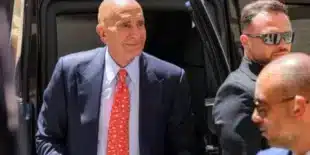Israel heightened its alert status for potential retaliation from Hezbollah following the assassination of Saleh al-Arouri, a top Hamas leader, in a strike in Beirut, an action widely attributed to Israel. This killing has intensified the possibility of a broader conflict in the Middle East.
Arouri’s death marks a significant moment in the ongoing Gaza war, providing a morale boost for Israelis in the wake of Hamas’ attack on October 7. However, the long-term effects of this incident on the war are uncertain. Israel has a history of eliminating top Hamas leaders, who are often quickly replaced. The location of the strike, in a Hezbollah stronghold in Beirut, raises concerns that it might escalate the current sporadic fighting along the Lebanon border into a full-scale war.
The response from Hezbollah’s leader, Sayyed Hassan Nasrallah, who has been in charge since his predecessor’s death in an Israeli strike in 1992, is particularly crucial. Nasrallah has promised retaliation for any Israeli actions targeting allied militant leaders in Lebanon. His reaction could significantly influence the direction of the conflict.
The exchanges of fire between Hezbollah and the Israeli military have been a near-daily occurrence since the Gaza war began. Nasrallah has previously shown reluctance to escalate the conflict, possibly to avoid a repeat of the extensive 2006 war between Israel and Hezbollah, which resulted in significant destruction in Beirut and southern Lebanon.
Israeli officials have not officially commented on the strike that killed Arouri. Israeli military spokesman Rear Adm. Daniel Hagari stated that Israel is prepared for any scenario.
The U.S. is actively working to prevent a further escalation of the conflict, deploying military assets to the region. Secretary of State Antony Blinken is expected to visit the region.
Arouri, who was the deputy of Hamas’ supreme political leader and a key liaison with Hezbollah, was a high-value target for Israel. His killing in Beirut is the first instance of Israel targeting top Hamas leaders outside of Gaza since the war began. Arouri’s role in Hamas included leadership in the West Bank, and he was listed as a terrorist by the U.S. State Department, which offered a reward for information about him.
Following the attack, Hamas leader Ismail Haniyeh affirmed the group’s strengthened resolve, while Hezbollah condemned the strike as a serious assault on Lebanon, vowing that it would not go unanswered.
In Gaza, Israeli Defense Minister Yoav Gallant expressed Israel’s objective for a decisive victory over Hamas. The war has resulted in significant casualties and displacement in Gaza, with a substantial portion of the population facing dire humanitarian conditions.
Accusations of genocide against Israel have been made by South Africa in a case filed with the International Court of Justice, claims that Israel strongly denies.
Despite ongoing hostilities, a multistage plan for ending the war has been proposed by Egypt and Qatar, involving the release of all hostages in exchange for Palestinians imprisoned by Israel, and a Palestinian government governing Gaza and parts of the West Bank until elections. Discussions about this proposal are ongoing, with an Israeli delegation in Cairo for negotiations. However, the killing of Arouri is expected to affect these talks.


